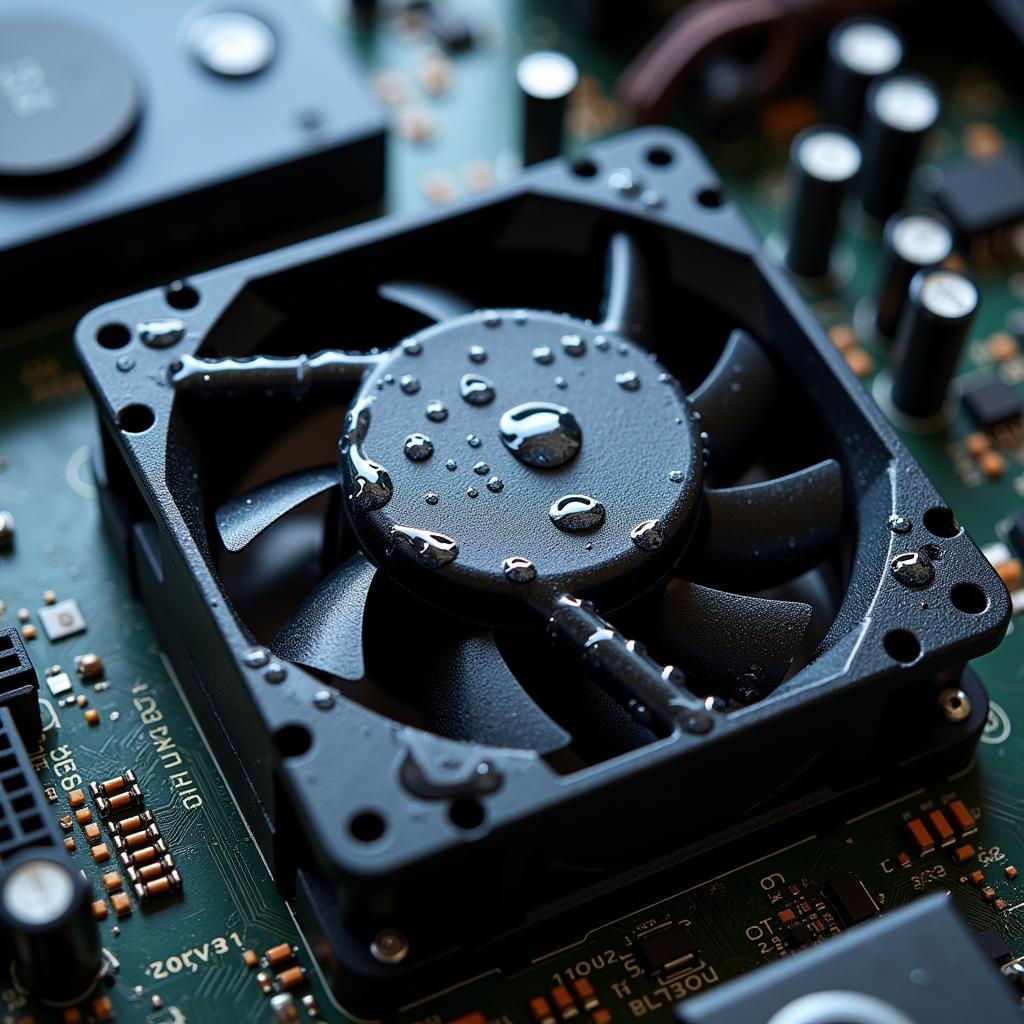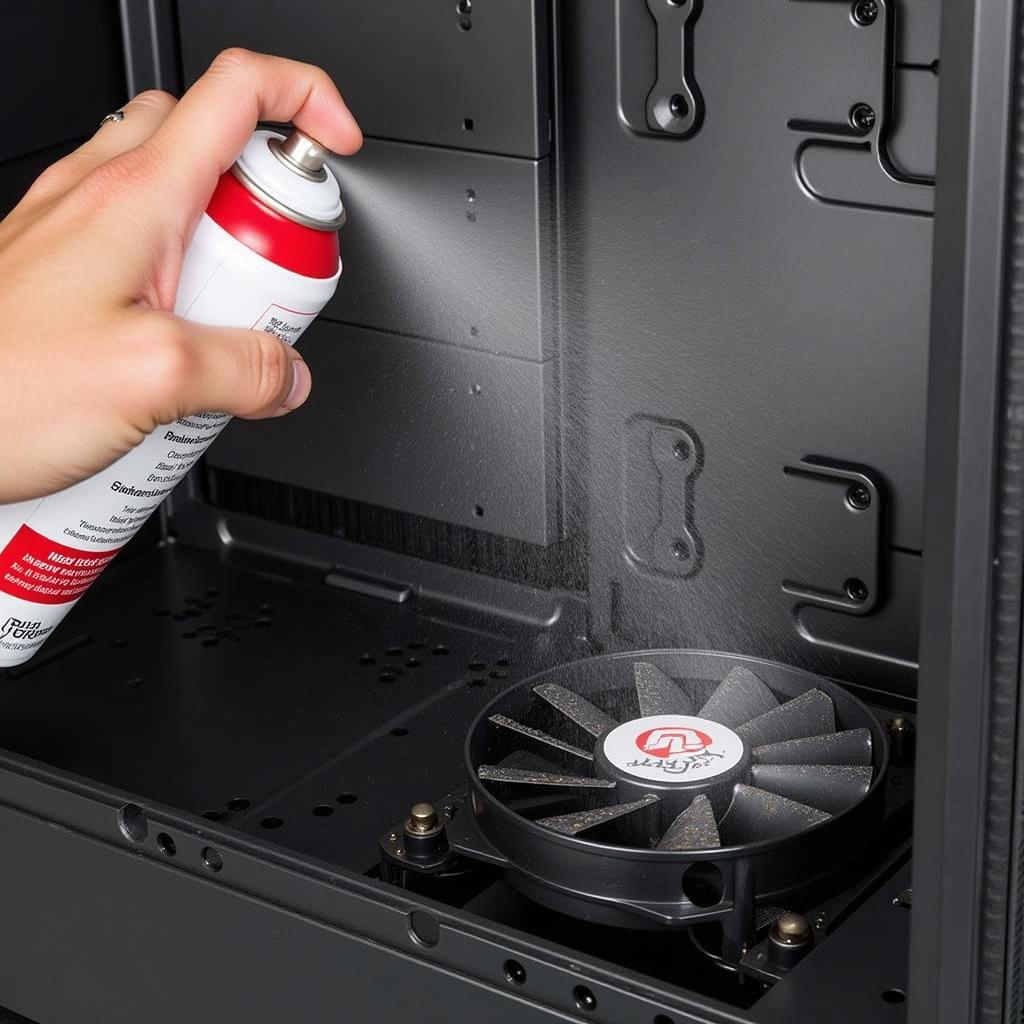Cleaning your CPU fan is essential for maintaining optimal computer performance. Dust and debris can accumulate over time, hindering its ability to cool your processor effectively. This can lead to overheating, reduced performance, and even hardware damage. While the idea of giving your CPU fan a quick rinse might seem tempting, the question remains: Can you wash a CPU fan under water?
The short answer is: it’s not recommended. While water itself isn’t inherently damaging to electronic components, the combination of water, electricity, and delicate parts within a CPU fan creates a risky situation.
Let’s delve deeper into why washing your CPU fan under water is generally discouraged and explore safer and more effective cleaning methods.
The Risks of Water Damage
 Close-up of a CPU fan with water droplets, illustrating potential damage.
Close-up of a CPU fan with water droplets, illustrating potential damage.
Water and electricity don’t mix, as you likely know. While a quick splash might not seem like a big deal, even a small amount of water can cause significant damage to your CPU fan and other computer components. Here’s why:
- Short Circuits: Water conducts electricity, and introducing it to the electrical components of your CPU fan can cause short circuits. This can lead to immediate and irreversible damage, potentially frying your fan or even your motherboard.
- Corrosion: Even if water doesn’t immediately cause a short circuit, it can lead to corrosion over time. This gradual degradation of metal parts can shorten the lifespan of your fan and lead to malfunctions.
- Mineral Deposits: Tap water contains minerals that can leave behind residue after drying. These deposits can accumulate on the fan blades and motor, affecting its performance and potentially causing noise.
Safe and Effective Cleaning Methods
 A person using a can of compressed air to clean a CPU fan.
A person using a can of compressed air to clean a CPU fan.
Instead of resorting to water, consider these safe and effective methods to clean your CPU fan:
- Compressed Air: Compressed air is the go-to solution for cleaning computer components. Use short bursts of air to blow away dust and debris from the fan blades, heatsink, and surrounding areas.
- Soft Brush: A soft-bristled brush, like a paintbrush or makeup brush, can be used to gently remove stubborn dust particles.
- Cotton Swabs: For hard-to-reach areas, cotton swabs dipped in isopropyl alcohol (90% or higher) can be helpful. Make sure to apply the alcohol to the swab, not directly onto the fan.
- Microfiber Cloth: A slightly damp (not wet) microfiber cloth can be used to wipe down the fan blades and housing. Avoid using paper towels or abrasive materials.
Pro Tip from Johnathan Smith, Senior Hardware Technician at Tech Solutions Inc.: “Always disconnect your computer from the power source before cleaning any internal components. This will minimize the risk of electrical shock or damage.”
Conclusion
While the thought of washing your CPU fan under water might cross your mind, it’s crucial to prioritize the safety and longevity of your hardware. Water poses significant risks, including short circuits, corrosion, and mineral deposits, which can lead to costly repairs or replacements.
Opt for safer and equally effective cleaning methods like compressed air, soft brushes, cotton swabs, and microfiber cloths. By following these practices, you can keep your CPU fan clean, ensure optimal cooling performance, and prolong the life of your computer.
FAQs
Can I use a vacuum cleaner to clean my CPU fan?
It’s not recommended to use a vacuum cleaner, as the suction can be too strong and potentially damage the fan blades. Additionally, static electricity from the vacuum can harm sensitive electronic components.
How often should I clean my CPU fan?
It’s generally recommended to clean your CPU fan every 3-6 months, depending on your usage and environment. If you notice your computer running hotter or the fan becoming noisier, it might be time for a cleaning.


